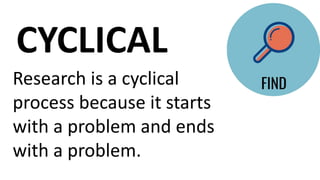The document discusses research ethics and characteristics of inquiry-based learning. It defines research and outlines its key characteristics such as being empirical, logical, cyclical, and analytical. It also discusses ethics in research including respecting subjects, presenting objective findings, and avoiding bias or deception. Examples of ethical dilemmas researchers may face involve fabricating or falsifying data, failing to correct errors, and deciding whether to share full datasets with other researchers.


























